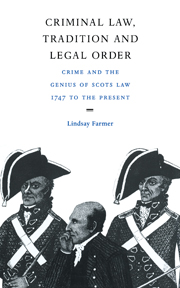Book contents
- Frontmatter
- Contents
- Acknowledgements
- 1 The boundaries of the criminal law: criminal law, legal theory and history
- 2 The genius of our law: legality and the Scottish legal tradition
- 3 The judicial establishment: the transformation of criminal jurisdiction 1747–1908
- 4 The ‘well-governed realm’: crime and legal order 1747–1908
- 5 The perfect crime: homicide and the criminal law
- 6 Conclusion: crime and the genius of Scots law
- Bibliography
- Index
6 - Conclusion: crime and the genius of Scots law
Published online by Cambridge University Press: 08 January 2010
- Frontmatter
- Contents
- Acknowledgements
- 1 The boundaries of the criminal law: criminal law, legal theory and history
- 2 The genius of our law: legality and the Scottish legal tradition
- 3 The judicial establishment: the transformation of criminal jurisdiction 1747–1908
- 4 The ‘well-governed realm’: crime and legal order 1747–1908
- 5 The perfect crime: homicide and the criminal law
- 6 Conclusion: crime and the genius of Scots law
- Bibliography
- Index
Summary
I learn that some beginners find Chapter 1, in its attempt to define the nature of Crime, exceptionally difficult. Those who do so, I advise to postpone its perusal until after they have read the rest of the volume. Definitions belong, indeed, rather to the end of our knowledge than to the beginning of it.
The definition of crime
The perceived need to produce a definition of crime has been one of the most extraordinary preoccupations of modern criminal lawyers. The debates on this question are difficult and impenetrable for beginners and more experienced criminal lawyers alike. The definitions that have been produced are not only uniformly technical in character but also seem ultimately to be trite and uninformative in their conclusions. Although viewed by many as a ‘sterile and useless’ exercise the question has none the less exerted a strange fascination over criminal lawyers. Between the beginning of this century and the late 1950s it was the subject of much debate. Even now the standard books on the criminal law almost invariably begin by attempting to define crime, and hence the scope of the criminal law. The most immediate feature of these scholarly definitions of crime and the criminal law is their circularity: a crime is that which is proceeded against in the criminal courts, and the criminal law deals with those acts that are crimes. However, this apparently unpromising insight reveals much about nature of the modern criminal law and its relationship with legal theory.
- Type
- Chapter
- Information
- Criminal Law, Tradition and Legal OrderCrime and the Genius of Scots Law, 1747 to the Present, pp. 175 - 186Publisher: Cambridge University PressPrint publication year: 1996



